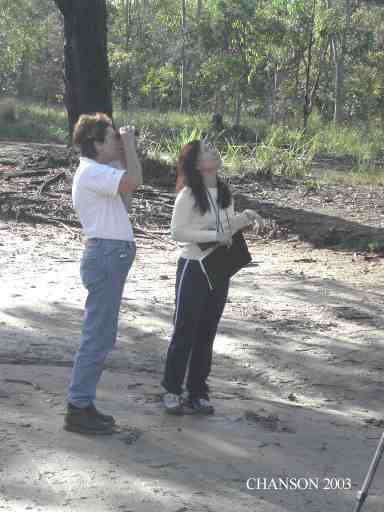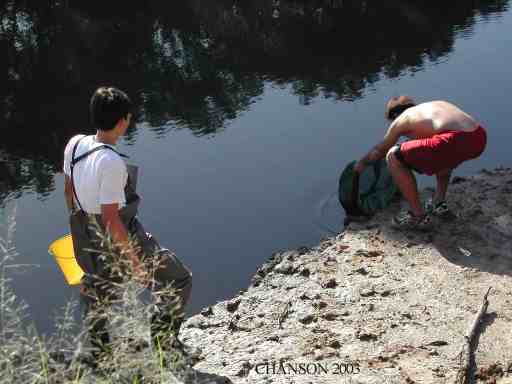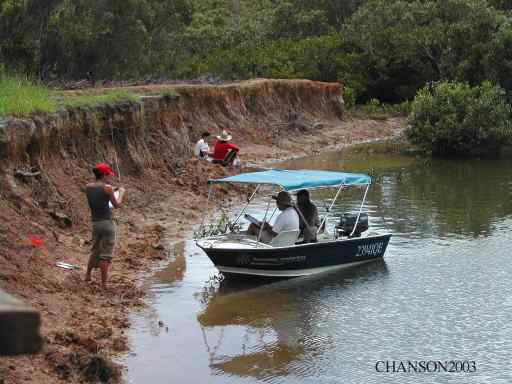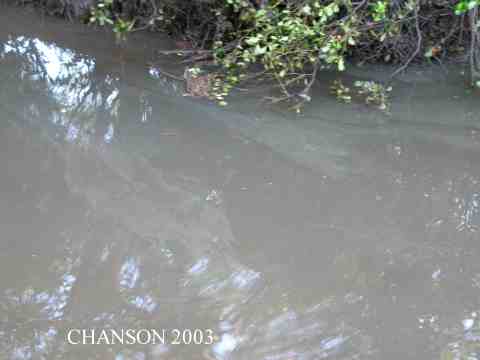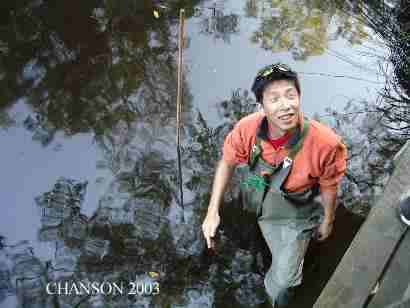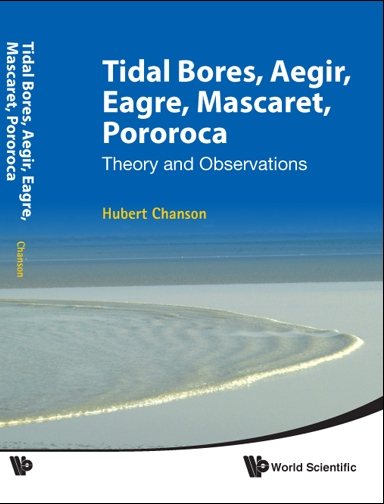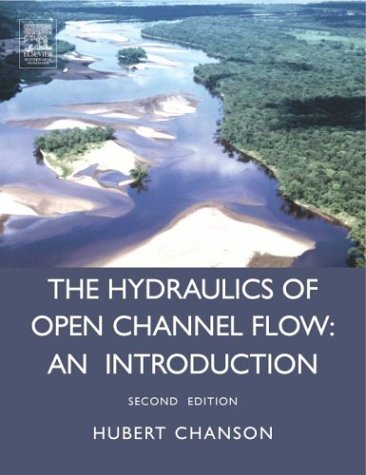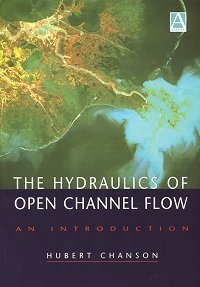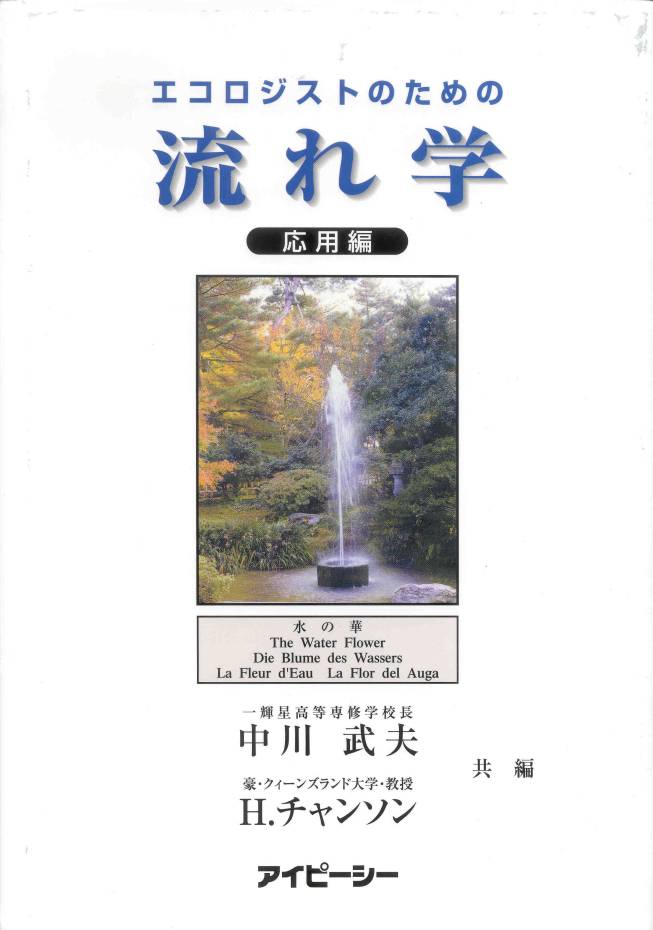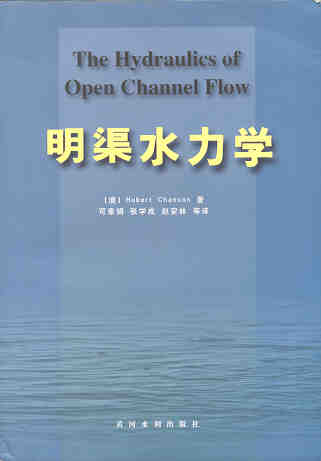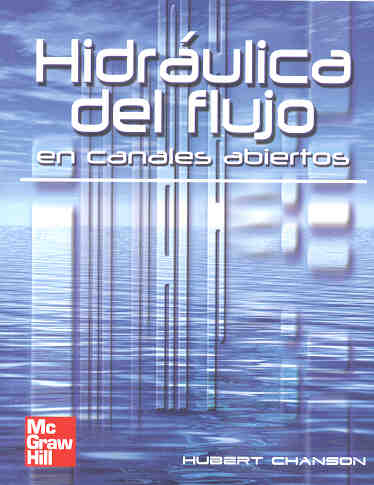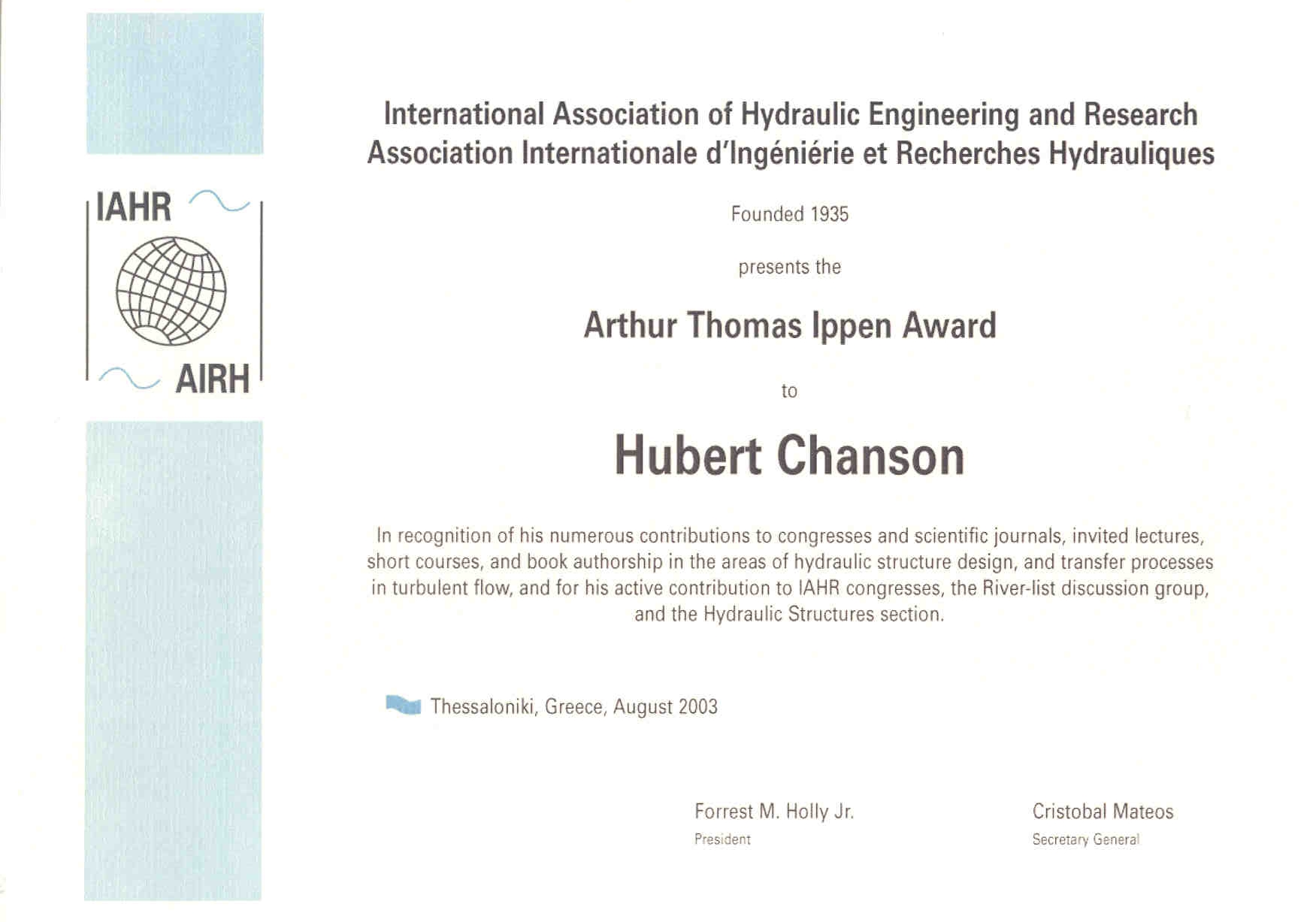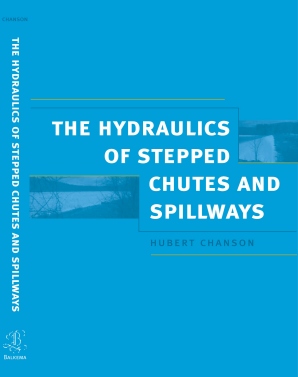CHANSON,
H. (2004). "Environmental
Hydraulics of Open Channel Flows."
Elsevier
Butterworth-Heinemann,
London, UK, 483 pages
(ISBN
978 0 7506 6165 2)
 ORDER
ORDER
Outline
Preface
Part 1: Introduction
Chapter 1 : Introduction
Chapter 2: Fundamentals of Open Channel Flows
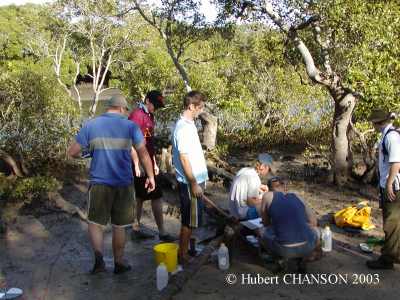
Part 2 : Mixing and Dispersion in Rivers and Estuaries
Chapter 3 - Introduction
Chapter 4 - Turbulent shear
flows
Chapter 5 - Diffusion :
basic
theory
Chapter 6 - Advective diffusion
Chapter 7 - Turbulent dispersion and mixing.
(1)Vertical and transverse mixing
Chapter 8 - Turbulent dispersion and mixing. (2)
Longitudinal dispersion
Chapter 9 - Turbulent dispersion in natural
systems.
Chapter 10 - Mixing in estuaries
Part 3 : Hydraulics of Unsteady Open Channel Flows
Chapter 11- Unsteady Open Channel Flows. 1- Basic
equations
Chapter 12- Unsteady Open Channel Flows. 2-
Applications
Chapter 13 - Unsteady Open Channel Flows. 3-
Application to Dam Break Wave
Chapter 14 - Numerical Modelling of Unsteady Open
Channel Flows
Part 4 : Interactions between Flowing water and its Surroundings
Chapter 15 - Interactions between Flowing water and
its Surroundings: Introduction
Chapter 16 - Interaction between Flowing water and
Solid Boundaries: Sediment processes
Chapter 17 - Interaction between Flowing water and
Free-surfaces: Self-aeration and Air entrainment
References
CHANSON, H. (2004). "Environmental Hydraulics of Open Channel
Flows." Elsevier Butterworth-Heinemann,
Oxford, UK, 483 pages (ISBN 978 0 7506 6165 2).
Book Reviews
Prof D.H. PEREGRINE, in
Jl of Fluid
Mech., 2006, Vol. 557, p. 473.
"Throughout the book the author’s enthusiasm for his subject shows.
Overall, the book lives up to its title. It forms a good
introduction
for an advanced undergraduate, or graduate student, and a guide to
further information for practitioner." (
Book
review at
EprintsUQ) (
Full
review)
Dr M. WILSON, in
Intl Jl River Basin
Management, 2005, Vol. 3, No. 4, p. 297.
"Overall
Environmental Hydraulics of
Open Channel Flows is a well written, clear and concise book
which will serve the intendend audience. It contains numerous diagrams
and photographs to illustrate key points. It stands alone from
Hydraulics
of Open Channel Flow: an
Introduction, unless the reader does not already have a basic
grounding in hydraulics."
Prof D.A. LYN, in
Environmental
Fluid Mechanics,
2005, pp. 987-391.
"This book contains some useful material for
different courses, and may provide an elementary reference."
Corrections
Chapter 11 - Unsteady Open
Channel Flows: 1. Basic equations
11.3.3 Application: numerical integration of the method
of characteristics
Correction to Eq.
(11.34d) (p. 209)
(11.34d) ... = VR - CR
Correction, p. 210 (top of page)
VR = .../(1 + dt/dx.(VC - CC
- VB + CB))
Chapter 12 - Unsteady
Open
Channel Flows: 1. Applications
12.3.2 Application
Correction to equation
beneath Eq.
(12.12a) (p. 231)
d(x=0, to) = C2(x=0,
to)/g
Chapter 13 - Unsteady
Open
Channel Flows: 3. Application to dam break wave
Dam break wave characteristic diagram (p. 268)
Correction to Figure
13.2. New corrected
figure.
See also
CHANSON, H. (2005). "Applications of the Saint-Venant Equations and
Method of Characteristics to the Dam Break Wave Problem." Report
No.
CH55/05, Dept. of Civil Engineering, The University of
Queensland,
Brisbane, Australia, May, 135 pages (ISBN 1864997966). (Download
PDF files: http://www.uq.edu.au/~e2hchans/reprints/ch5505.zip
[2.8 Mb])
Chapter 17 - Interactions
between flowing water and free-surfaces
Application to steep chute flows
Corrections to
Equation(17.20) and (17.21)
(17.20) d/s
=
0.0212 (sina)-0.11
(s/(h
cosa))-0.10
where d is the boundary layer thickness
(17.21) d/s
= 0.0301 (sina)-0.11
(s/(h
cosa))-0.17
Updates
Dam break wave on dry channel (pp. 278-281)
New analytical
developments with explicit solutions
CHANSON, H. (2005). "Applications of the Saint-Venant Equations and
Method of Characteristics to the Dam Break Wave Problem." Report
No.
CH55/05, Dept. of Civil Engineering, The University of
Queensland,
Brisbane, Australia, May, 135 pages (ISBN 1864997966). (Download
PDF files: http://www.uq.edu.au/~e2hchans/reprints/ch5505.zip
[2.8 Mb])
Tsunami (pp. 298-299)
Useful Links
Rating : [***] = superb, must see - [**] = excellent
General
Rivers Seen
from Space [**]
Structurae,
International Database and Gallery of Structures [**]
Qanats
: an
historical account [*]
Gallery of Photographs in Fluid Mechanics,
Hydraulic & Environmental Engineering and Engineering History
ASME
Database (American Society of Mechanical Engineers)
The Formal Water Garden
Unesco Photobank
[**]
E-Fluid
Basic Fluid Dynamics
Gallery
of
photographs in fluid dynamics by Mark Kramer [**]
Atmosphere
The
Morning Glory : amazing waves [**]
Mixing and dispersion
Mixing in estuarine zones
Inlets
on-line (USACE) [**]
Estuaries in South Africa [*]
Deep sea currents / Oceanic circulation
University of Washington PALACE Floats {http://flux.ocean.washington.edu/}
[**]
Scripps Dive into Science {http://aquarium.ucsd.edu/divein/divein.html}
TOPEX/Poseidon Mission {http://topex-www.jpl.nasa.gov/}
[***]
The Scripps Institution of Oceanography {https://scripps.ucsd.edu/}
Woods Hole Oceanographic Institution (WHOI) {http://www.whoi.edu/home/}
Coastal engineering
Gallery of photographs of coastal processes {http://www.uq.edu.au/~e2hchans/photo.html#Coastlines}
Great Barrier Reef, National Geographic {http://www.nationalgeographic.com/ngm/0101/feature2/index.html}
Oceanic turbulence around Japanese islands {http://nisidriv.cv.noda.sut.ac.jp/www/eddy.htm}
Tide predictions : Australia
- Worldwide
(in French) - Wordlwide (in
English)
Brownies Coastwatch (Qld) {http://www.browniescoastwatch.com/}
Photographs of tidal bores {http://www.uq.edu.au/~e2hchans/photo.html#Tidal
bores,
mascaret, pororoca}
The tidal bore of the Seine river {http://www.uq.edu.au/~e2hchans/mascaret.html}
Whirlpools {http://www.uq.edu.au/~e2hchans/whirlpl.html}
Tsunamis {http://www.uq.edu.au/~e2hchans/photo.html#Tsunami}
Tidal links {http://www.linden-software.com/links.html}
Hydrology/Weather
National Weather Service Office
of Hydrology
El Niño
Information in California
Extreme
reservoir siltation in Australia
River engineering
The tidal
bore of
the Seine river
Artifical
river
habitats and fish passes (photographs)
Flood
plains (photographs)
Weirs
and
small dams on the Kent river (UK) [**]
Computational modelling in
hydraulics
Softwares
Hydrochan (TM)
[**] Gradually-varied flows (1D) (for
teaching purposes ONLY)
US Army Corps of Engineers HEC
Softwares
Water quality issues
Chicago Calumet waterway: sidestream
aeration
cascades
Petit-saut dam (French Guyana): aeration
cascade
Petit-Saut
dam : photographs,
dam
details
The Aral sea
Photographs {http://www.uq.edu.au/~e2hchans/photo.html#Flood
plains}
NASA Earth Observatory (1)(2)
TETHYS (Kazakhstan) and JRAK
(Japan) Ecological expedition {http://www.kz/gallery/aral/tpict1.html}
Trip in Uzbekistan {http://www.fantasia.net/errol/}
Australian
Bureau of Meteorology
Goulburn-Murray
Water
Hydro-Electric Corporation
(Tasmania)
Murray-Darling Basin Commission
NSW Department
of Land and Water Conservation
QLD Department of Natural
Resources [Water,
Storages]
[Glossary
of
terms]
Extreme
reservoir siltation in Australia
Resources
University of
Queensland Library
Measurement
systems : SI Units and significant figures
Reprints
of Research Papers
Internet
resources
in Hydraulic Engineering : rubber dams, tidal bore,
reservoir siltation, MEL culverts ...
ICEnet: The Institution of Civil
Engineers, UK Homepage
Japan Society
of Civil Engineers
ASCE - American Society of Civil
Engineers Homepage
ASME - American Society of Mechanical
Engineers
ENPC - Ponts et Chaussees
IAHR homepage (International
Association for Hydraulic Research)
US Geological Survey
Civil Engineering Resources on the Internet (GuideMe.com)
Hubert
CHANSON
is a Professor in Civil Engineering,
Hydraulic Engineering and Applied Fluid Mechanics, at
the University of Queeensland,
Australia. His research interests include design of hydraulic
structures, experimental investigations of two-phase flows, coastal
hydrodynamics, water quality modelling, environmental management and
natural resources. He has been an active consultant for both
governmental agencies and private organisations. His publication record
includes over 550 international refereed papers and his work was cited
over 2,700 times since 1990. Hubert Chanson is the
author
of several books : "Hydraulic
Design
of
Stepped Cascades, Channels, Weirs and Spillways" (Pergamon,
1995), "Air Bubble Entrainment in Free-Surface
Turbulent Shear Flows" (Academic
Press, 1997), "The Hydraulics of
Open Channel Flow : An Introduction" (Butterworth-Heinemann,
1st
edition 1999, 2nd editon 2004),
"The Hydraulics of Stepped Chutes and
Spillways" (Balkema, 2001), "Environmental
Hydraulics of
Open Channel
Flows" (Butterworth-Heinemann,
2004), "Applied
Hydrodynamics:
an Introduction of Ideal and Real Fluid Flows" (CRC
Press, 2009),
and "Tidal
Bores,
Aegir, Eagre, Mascaret, Pororoca: Theory And Observations" (World
Scientific, 2011). He
co-authored two further books "Fluid
Mechanics
for Ecologists" (IPC Press,
2002) and "Fluid Mechanics for Ecologists. Student Edition" (IPC,
2006). His textbook "The
Hydraulics of Open Channel Flows : An
Introduction" has already been translated into Spanish (McGraw-Hill
Interamericana)
and Chinese (Hydrology Bureau of Yellow River Conservancy
Committee), and the second
edition was published in 2004. In 2003, the IAHR
presented him with the 13th Arthur Ippen
Award for outstanding
achievements in hydraulic engineering. The American Society of Civil
Engineers, Environmental and Water Resources Institute (ASCE-EWRI)
presented him with the 2004 award for the Best Practice paper in the
Journal of Irrigation and Drainage Engineering ("Energy
Dissipation
and Air Entrainment in
Stepped Storm Waterway" by Chanson and Toombes 2002). Hubert
Chanson edited further several books : "Fluvial,
Environmental and
Coastal Developments in Hydraulic
Engineering" (Mossa, Yasuda & Chanson 2004, Balkema),
"Hydraulics.
The
Next
Wave" (Chanson & Macintosh 2004, Engineers
Australia), "Hydraulic
Structures:
a
Challenge to Engineers and Researchers" (Matos & Chanson 2006, The University of Queensland), "Experiences
and
Challenges in Sewers:
Measurements and Hydrodynamics" (Larrate & Chanson 2008,
The University of Queensland),
"Hydraulic
Structures:
Useful
Water Harvesting Systems or Relics?" (Janssen & Chanson 2010,
The University of Queensland),
"Balance
and
Uncertainty: Water in a Changing World" (Valentine et al. 2011, Engineers Australia).
He chaired the Organisation of the 34th
IAHR World Congress held in Brisbane, Australia between 26
June and 1 July 2011.
His Internet home page is http://www.uq.edu.au/~e2hchans.
He also developed a gallery of photographs website {http://www.uq.edu.au/~e2hchans/photo.html}
that received more than 2,000 hits per month since inception.
Back to TOP
Back to Prof Hubert CHANSON's Home Page
This page was visited xxxx times
since 12-12-2003.
Last updated on 08/09/2011.


